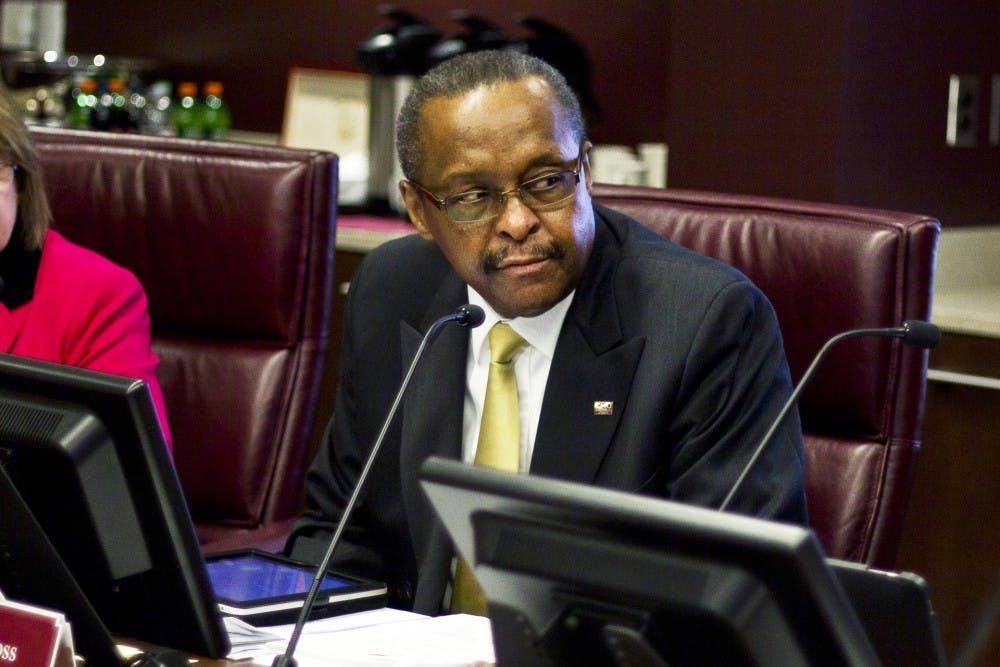Board of Trustees gives University President George Ross full support in job review

George Ross has a favorable view from the Board of Trustees following an assessment of his job on Thursday.
"President Ross enjoys the support of CMU's diverse stakeholders, both on and off campus," read the report submitted by Trustees Brian Fannon, Marilyn French Hubbard and John Hurd.
The review assessed Ross' performance, looking back to March 1, 2010, Ross' first day. It asked two questions: How has CMU progressed under Ross, and what indications are there that Ross has maintained support of internal and external constituencies?
But the report wasn't all positive. It acknowledged issues, and Fannon acknowledged existing issues with both the Faculty Association and the Graduate Student Union.
"There were expressions of concerns about the president's leadership, particularly from the leadership of the Academic Senate and the Faculty Association," the report stated.
Ross said communication is key going forward.
"I hear you loud and clear," he said to the board. "I hear the constituents loud and clear."
The report gave Ross 12 points as "constructive recommendations."
First, the board asked Ross to continue working on relationships with faculty, engagement, communication, attendance to campus events and to work toward a shared governance system.
They also asked him to increase a personal focus to the direction of the university, be flexible and develop relationships with advisers, coaches and mentors.
A total of 62 faculty, academic administrators, senior administrators, student leaders, staff and external stakeholders were interviewed for the report.
Fannon said an FA survey sent to board members last week showing large concerns about Ross' leadership style isn't considered in the report. However, all trustees have read the survey and understand it.
As part of the report, the trustee committee made recommendations for the board to review the Shared Governance and Communications Committee report, enhance communication with the Academic Senate Executive Board, periodically meet with Ross to share with the review process, develop a comprehensive review for Ross and to look at CMU's collective bargaining thinking.
"Review collective bargaining philosophy and goals for the university, and, in particular, the board and president need to review the most recent collective bargaining experience with the Faculty Association in order to develop and guide a more effective and constructive approach to the 2014 negotiations," the trustees said in the report.
Ross said he hoped the campus community would work together to unify the university.
"Accomplishments come as a group," he said.
Ross said when he submitted his personal evaluation of his job performance to the board, it was similar to how the report graded him.
"The messages and the recommendations center around communication and working toward healing, and I'm committed to that," Ross said.
Jim Hageman, special assistant to Ross and co-chair of the Shared Governance Committee, said Ross knew of the issues and is taking the proper steps to fix them.
"The president's sense of urgency to address the shared governance was because he was already aware of faculty unhappiness with regard to what they were feeling like they weren't in the know and it wasn't being shared efficiently," he said. "It seemed to me (the report) was fair and thorough."
Academic Senate chairman Jim McDonald said he thought the report coincided with many of the things Ross has acknowledged himself.
He said, however, that he has not seen enough action from Ross, something he hopes will change. He's also concerned that there has been a reluctance to talk about issues from the 2011-12 academic year.
Following a faculty strike that semester, several other issues resulted between Ross and the campus community, and Ross received a vote of no confidence from the A-Senate in December 2011.
"If President Ross doesn't even want to talk about what happened last year, I don't see how you can move on," McDonald said.
He also said he hopes the board learns from the recommendations it gave itself.
"While I don't want them to micromanage the day-to-day operations of the university, they need to become more involved on campus," McDonald said.



